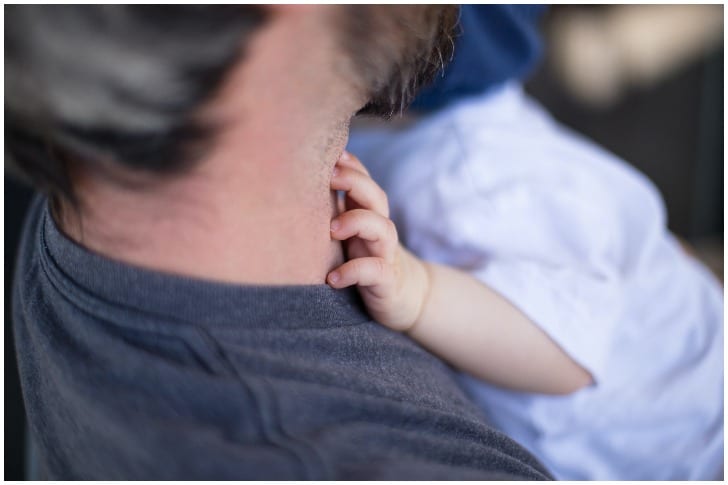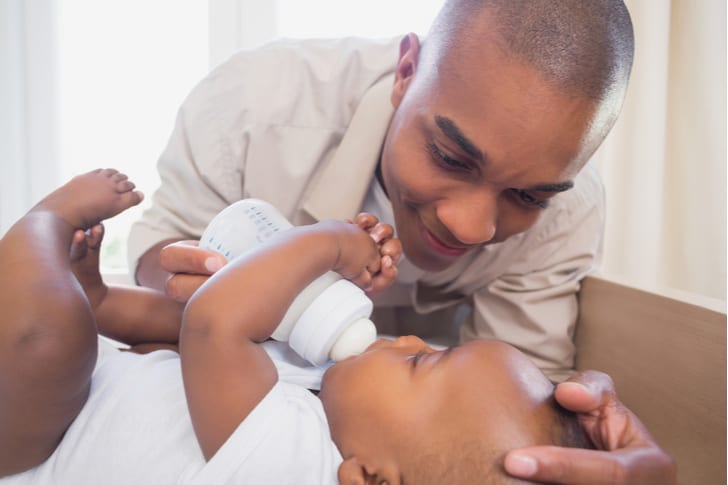The minute you announce the pregnancy, advice from all directions starts pouring in, which can drown out the actual points that a future father needs to know. We have prepared the ultimate cheat-sheet that will allow you to score top marks in the impending test of caring for a child.
Preparing for the Big Day

kryscina/Unsplash: Dad holding his child in arms comfortably
Make yourself familiar with the whole process. The delivery of a baby can get stressful; fathers should know ways to comfort the mother through breathing techniques. Also, sign up for classes offered by the doctor’s office to tour the labor and delivery area. Ask their tips on what you can do to help manage the mom’s pain and familiarize yourself with the stages of labor.
Appropriate Amount of Food to Be Given

A father carefully feeds his child
It is vital to know how the baby’s stomach develops within a month after they are born. Immediately after birth, it is the size of a marble and can hold around one teaspoon of food, but after ten days, it takes the size of a large egg that can hold four tablespoons. If a child is fussy, try burping them or breastfeeding again.
Preparing to Give the Bottle
Breastfeeding does not have to be the only way to feed, as many parents also try giving their babies bottles early on. The milk in the container should be around 98.5 degrees Fahrenheit, which can be measured via a food-grade thermometer.
Amount of Diapers to Buy
The baby’s first week of coming into the world usually results in five to six wet diaper changes. Depending on whether the little one is fed formula or breastmilk, you may need to change an extra diaper for each passing day for the first seven days. After this, the baby can go anywhere between one to twelve stools per day.
Changing a Diaper

Probably the most searched problem of a couple—it is not that hard. When baby boys urinate, they can aim right at you, so remember to shield yourself and as for baby girls, remember to wipe the area in a front to back motion. Also, please do not make the mistake of letting a child wander around in a wet diaper for too much time as they can develop a rash.
Figure out a plan to discharge a diaper almost ten times a day before your baby comes.
Packing a Diaper Bag
Wet wipes, diapers, an extra set of clothes, and a burp rag are essential diaper bag items. If your baby is formula-fed, then pack extra bottles. Other essential things that will help you are changing pad, a change of clothing for you (toilet and vomit accidents!), hand sanitizer, toys, and pacifiers.
Swaddling a Baby
You can ask for tips from a nurse; usually, the comfort and warmth of the womb should be replicated to help the baby sleep.
Sleeping Area for the Baby
For toddlers, doctors recommend you to set up a crib or a bassinet in the parents’ room so that it is helpful in late-night feeding or changing. Also, a baby should never be sleeping in your bed and should always sleep on their backs to avoid sudden infant death syndrome (SIDS).
When the baby is napping, parents should sleep too because caring for a child is exhausting, and they need rest.
Car Seats
It is best to get two car seats. The first is the infant car seat that fastens into the base to help move the baby without waking them up. The other one should be a convertible seat to use in the coming years.
You are all set! As long as you stay educated and receptive to your family’s needs, it is going to be just fine, so don’t stress about it.
